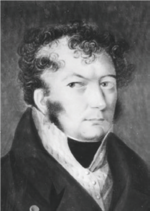Carl August Eckart (VI 18)/en: Unterschied zwischen den Versionen
Keine Bearbeitungszusammenfassung |
(Die Seite wurde neu angelegt: „At the end of 1815, Carl August Eckart, the youngest son, took over the post house and Gastwirte_und_Posthalter_-_…“) |
||
| Zeile 4: | Zeile 4: | ||
[[Datei:CarlAugustEckart.png|150px|thumb|right|Carl August Eckart]]'''Carl August Eckart''''', (VI 18), (*November 25, 1787, in Emskirchen, Germany; †November 16, 1857, in Emskirchen, Germany), owner of the inn “Goldener Hirsch”, postmaster of his Majesty the King of Bavaria, man of independent means; married Kunigunda Galster on January 7, 1816, in Emskirchen, Germany'' | [[Datei:CarlAugustEckart.png|150px|thumb|right|Carl August Eckart]]'''Carl August Eckart''''', (VI 18), (*November 25, 1787, in Emskirchen, Germany; †November 16, 1857, in Emskirchen, Germany), owner of the inn “Goldener Hirsch”, postmaster of his Majesty the King of Bavaria, man of independent means; married Kunigunda Galster on January 7, 1816, in Emskirchen, Germany'' | ||
At the end of 1815, Carl August Eckart, the youngest son, took over the [[Die_Posthalterei_der_Familie_Eckart/en|post house]] and [[Gastwirte_und_Posthalter_-_Der_Gasthof_„Goldener_Hirsch“_und_die_Familie_Eckart/en|coaching inn "Goldener Hirsch" (Golden Deer)]] from his mother Maria Christina Eckart. Shortly afterwards, in January 1816, he married the well-to-do Kunigunda Galster (*March 26, 1790, in Igelsdorf, Germany; †April 28, 1882, in Emskirchen, Germany). It is said that the so-called “Napoleon of Emskirchen”, as he was nicknamed, had ridden three white horses to the point of exhaustion to visit his betrothed in her home-town Erlangen. On June 18, 1816, Carl August Eckart took up the office of postmaster of his Majesty the King of Bavaria.<ref>Eckart Family Archive, J I 536. Docket regarding the resignation of Maria Christina Lindner from the postal service, 1816.</ref> In addition to the post house and the inn "Goldener Hirsch", he owned numerous plots of land. Between 1823 and 1830 alone, he bought several residential houses with adjacent fields and meadows.<ref>Eckart Family Archive, C. A. I 118 a–d. Property transactions of Carl August Eckart, 1823—1829/30.</ref> In 1846, Carl August Eckart retired; in February, he transferred the post house and the inn "Goldener Hirsch" to his son [[Gottfried Eckart (CA VII 4)/en|Gottfried]].<ref>Eckart Family Archive, C. A. I 054. Deed of purchase for the inn "Goldener Hirsch" with the post house, sold by Carl August Eckart to his son Gottfried Eckart, February 12, 1846.</ref> The unexpected death of his two brothers [[Georg Eckart (VI 14)/en|Georg]] and [[David Eckart (VI 17)/en|David Eckart]] prompted Carl August to draw up his [[Testamente von Carl August Eckart/en|will]] in 1854. These instructions for his descendants are in the [[ Archiv der Familie Eckart/en|Eckart Family Archive]] today. Carl August Eckart died only nine days before his 70th birthday, on November 16, 1857. He was buried in the Emskirchen graveyard, in the family tomb that he built. The descendants of Carl August’s eldest son [[Johannes Eckart (CA VII 2)/en|Johannes]] in Possenheim are listed on the family branch sheet CAP. | |||
<div class="mw-translate-fuzzy"> | <div class="mw-translate-fuzzy"> | ||
Version vom 12. Juli 2021, 14:44 Uhr
Carl August Eckart, (VI 18), (*November 25, 1787, in Emskirchen, Germany; †November 16, 1857, in Emskirchen, Germany), owner of the inn “Goldener Hirsch”, postmaster of his Majesty the King of Bavaria, man of independent means; married Kunigunda Galster on January 7, 1816, in Emskirchen, Germany
At the end of 1815, Carl August Eckart, the youngest son, took over the post house and coaching inn "Goldener Hirsch" (Golden Deer) from his mother Maria Christina Eckart. Shortly afterwards, in January 1816, he married the well-to-do Kunigunda Galster (*March 26, 1790, in Igelsdorf, Germany; †April 28, 1882, in Emskirchen, Germany). It is said that the so-called “Napoleon of Emskirchen”, as he was nicknamed, had ridden three white horses to the point of exhaustion to visit his betrothed in her home-town Erlangen. On June 18, 1816, Carl August Eckart took up the office of postmaster of his Majesty the King of Bavaria.[1] In addition to the post house and the inn "Goldener Hirsch", he owned numerous plots of land. Between 1823 and 1830 alone, he bought several residential houses with adjacent fields and meadows.[2] In 1846, Carl August Eckart retired; in February, he transferred the post house and the inn "Goldener Hirsch" to his son Gottfried.[3] The unexpected death of his two brothers Georg and David Eckart prompted Carl August to draw up his will in 1854. These instructions for his descendants are in the Eckart Family Archive today. Carl August Eckart died only nine days before his 70th birthday, on November 16, 1857. He was buried in the Emskirchen graveyard, in the family tomb that he built. The descendants of Carl August’s eldest son Johannes in Possenheim are listed on the family branch sheet CAP.
Notes
Einzelnachweise
- ↑ Eckart Family Archive, J I 536. Docket regarding the resignation of Maria Christina Lindner from the postal service, 1816.
- ↑ Eckart Family Archive, C. A. I 118 a–d. Property transactions of Carl August Eckart, 1823—1829/30.
- ↑ Eckart Family Archive, C. A. I 054. Deed of purchase for the inn "Goldener Hirsch" with the post house, sold by Carl August Eckart to his son Gottfried Eckart, February 12, 1846.
